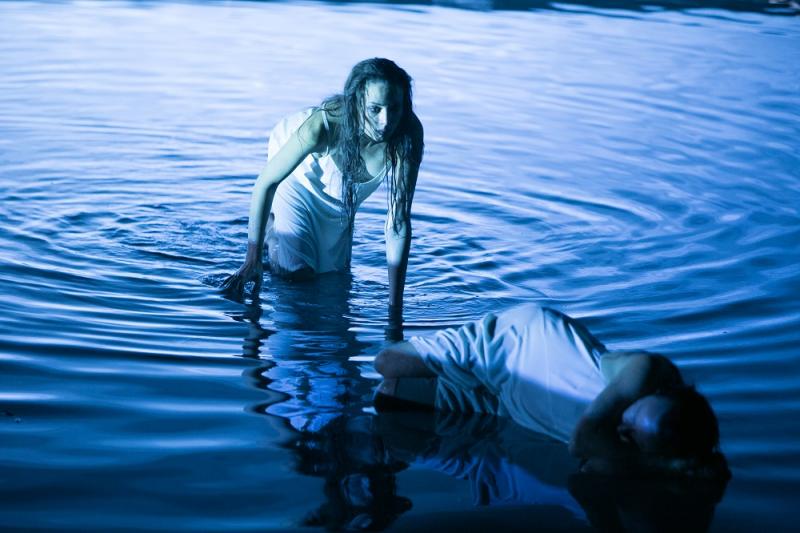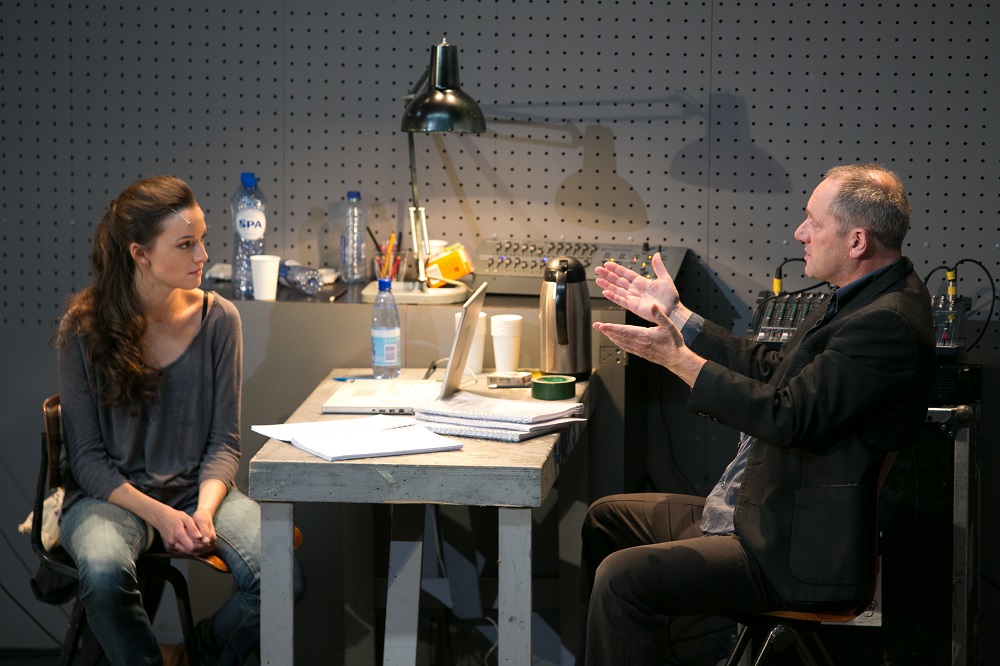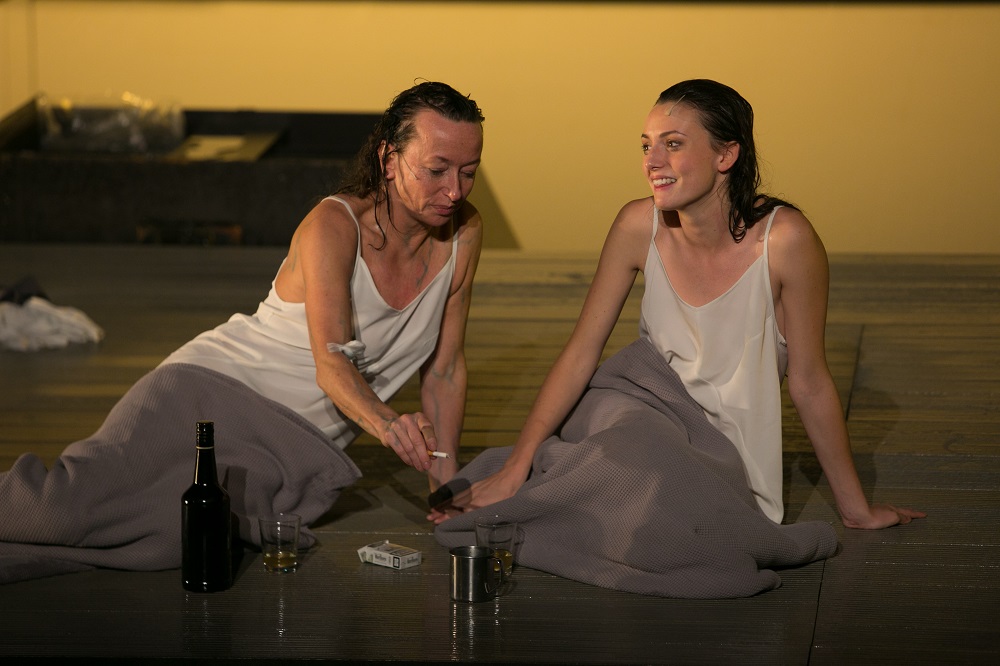After the Rehearsal/Persona, Toneelgroep Amsterdam, Barbican - van Hove reconfigures Bergman | reviews, news & interviews
After the Rehearsal/Persona, Toneelgroep Amsterdam, Barbican - van Hove reconfigures Bergman
After the Rehearsal/Persona, Toneelgroep Amsterdam, Barbican - van Hove reconfigures Bergman
Two dramas about acting and being, illusion and reality, form an inseparable whole

Three tall orders must be met in any successful transfer of an Ingmar Bergman text from screen to stage. First, take a company of actors as good as the various ones that the master himself assembled over the years, both in his films and in the theatre; Ivo van Hove’s Toneelgroep is one of the few in the world today up to the mark, working just as intensively.
The premise of After the Rehearsal is bound to make this Persona unlike Bergman’s queasy masterpiece, given the same three main actors: mother, daughter and director in the backstage/onstage drama; older woman, young and inexperienced nurse, older woman’s husband in the deeper drama about who’s who. Liv Ullmann was in her late twenties when she immortalised the role of the wilfully mute Elisabeth Vogler, Bibi Andersson as Nurse Alma actually three years her senior; the dynamic here is quite different, so no point in expecting the famous image of merged faces. One thing remains, though: even without the benefit of close-ups, Marieke Heebink and Gaite Jansen offer no less rigorous a double act, with Gijs Scholten van Aschat their equal in an uncanny naturalism.
That’s something I rarely see in UK theatre. It means adjusting to the usual Toneelgroep package: the amplified voices, the held video camera work which is verging on cliché (we don’t get it in Persona), the constant underscoring in such contrast to Bergman’s very sparing use of music. Even if this is not quite the stripped-away focus on the art of performance director Henrik Vogler (Scholten van Aschat, pictured below with Gaite Jansen) says he wants but can’t achieve, addicted as he is to the flummery of decadent theatre, within minutes of After the Rehearsal you’re compelled by the reality of the characterisations. Jansen – youthful beauty incarnate, possibly over the course of the evening even finer than Bergman’s original, Lena Olin - is Anna, the young actor playing Indra’s Daughter in Vogler’s production of Strindberg’s A Dream Play (Bergman’s obsession, too, throughout his life). Yet though this starts as what could be an artificial debate on the nature of theatre, with Vogler’s lofty pronouncements on the dramatic calling undercut in typical Bergman fashion by the girl’s mockery and his own intermittent self-disgust, the personal soon comes flooding in. Anna’s parents were also actors, her mother Rachel (Heebink) seen in what turns out to be a flashback – von Hove doesn’t make it easy at first for us to realise it, since his Anna remains onstage – drunkenly trying to get her ex-lover to have sex with her, pleading for a bigger role. She’s had some kind of mental breakdown, she’s briefly been an abusive mother; through all this, Heebink makes us feel both viscerally and emotionally for her humanity. Van Hove never gives the crucial information that Rachel died not long after the confrontation.
Jansen – youthful beauty incarnate, possibly over the course of the evening even finer than Bergman’s original, Lena Olin - is Anna, the young actor playing Indra’s Daughter in Vogler’s production of Strindberg’s A Dream Play (Bergman’s obsession, too, throughout his life). Yet though this starts as what could be an artificial debate on the nature of theatre, with Vogler’s lofty pronouncements on the dramatic calling undercut in typical Bergman fashion by the girl’s mockery and his own intermittent self-disgust, the personal soon comes flooding in. Anna’s parents were also actors, her mother Rachel (Heebink) seen in what turns out to be a flashback – von Hove doesn’t make it easy at first for us to realise it, since his Anna remains onstage – drunkenly trying to get her ex-lover to have sex with her, pleading for a bigger role. She’s had some kind of mental breakdown, she’s briefly been an abusive mother; through all this, Heebink makes us feel both viscerally and emotionally for her humanity. Van Hove never gives the crucial information that Rachel died not long after the confrontation.
The dialogue between the two older but in some ways no wiser lovers forms the centrepiece; after it, there’s a mesmerising play-within-a-play as Henrik and Anna go through what would happen if they succumbed to an affair. In both relationships, von Hove’s insistence on easy physicality and the actors’ perfect execution of it lend a dimension missing in the film.
It’s clear from the daughter’s illusionary presence in the painful heart of the drama that von Hove is setting up the mirror images which will be the essence of Persona; there’s a moving sequence where Rachel launches into Dionysus’s opening speech in Euripides The Bacchae to prove that she’s not finished as a performer and Anna is transfixed. But we’re never allowed to forget what looks more like a recording studio than the stage on which the rehearsal has just taken place. It becomes a clinical room in which Heebink’s Elisabeth Vogler lies, naked, sculptural, motionless, on a table at the start of Persona while Lineke Reijxman’s Doctor runs through her backstory to Alma; while playing Electra, the great actor has retreated into silence. Is Alma up to caring for the older woman? The test comes as the studio/hospital room slides back, the walls collapse and an open stage filled with water, sensually reflected on the back wall by the design genius of Toneelgroep, Jan Versweyveld, takes the place of Bergman’s beloved Fårö as the location where the women play out their changing dynamic in isolation. It holds as an alternative metaphor to the film, most of the action taking place on what could be a floating jetty. We see Alma talking too much, revealing a past sexual experience which led to the worst event of her life while Elisabeth watches enigmatically, gets her to drink and smoke (Heebink and Jansen pictured above). Jansen is superb as the speaker turns to resentment and violence, having discovered a letter in which Elisabeth has written of her satisfaction in toying with an enjoyable victim.
Is Alma up to caring for the older woman? The test comes as the studio/hospital room slides back, the walls collapse and an open stage filled with water, sensually reflected on the back wall by the design genius of Toneelgroep, Jan Versweyveld, takes the place of Bergman’s beloved Fårö as the location where the women play out their changing dynamic in isolation. It holds as an alternative metaphor to the film, most of the action taking place on what could be a floating jetty. We see Alma talking too much, revealing a past sexual experience which led to the worst event of her life while Elisabeth watches enigmatically, gets her to drink and smoke (Heebink and Jansen pictured above). Jansen is superb as the speaker turns to resentment and violence, having discovered a letter in which Elisabeth has written of her satisfaction in toying with an enjoyable victim.
Yet while we remember the film as a claustrophobic horror – somehow the island setting only intensifies the feeling of being trapped – the openness of this scene, the merciless sun and finally the warmer lighting as Alma tells Elisabeth she is not, and will not become, the same as her patient, moves towards transcendence. Scholten van Aschat briefly appears as Elisabeth’s husband, addressed by the younger woman; clinging together in the water, they tie the strands even closer to the first play. But here a final touch of grace, and a light, ironic epilogue, lift the spirits, if only very subtly. In some of his greatest films, from The Seventh Seal to Autumn Sonata, Bergman takes us into hell and out, purged to varying degrees. His Persona is not in that category; van Hove’s is, sending you out of the theatre lighter than when you arrived. But like Bergman, he really makes you work. This is a production that will resonate long after the performance.
rating
Share this article
The future of Arts Journalism
You can stop theartsdesk.com closing!
We urgently need financing to survive. Our fundraising drive has thus far raised £49,000 but we need to reach £100,000 or we will be forced to close. Please contribute here: https://gofund.me/c3f6033d
And if you can forward this information to anyone who might assist, we’d be grateful.

Subscribe to theartsdesk.com
Thank you for continuing to read our work on theartsdesk.com. For unlimited access to every article in its entirety, including our archive of more than 15,000 pieces, we're asking for £5 per month or £40 per year. We feel it's a very good deal, and hope you do too.
To take a subscription now simply click here.
And if you're looking for that extra gift for a friend or family member, why not treat them to a theartsdesk.com gift subscription?
more Theatre
 Macbeth, RSC, Stratford review - Glaswegian gangs and ghoulies prove gripping
Sam Heughan's Macbeth cannot quite find a home in a mobster pub
Macbeth, RSC, Stratford review - Glaswegian gangs and ghoulies prove gripping
Sam Heughan's Macbeth cannot quite find a home in a mobster pub
 The Line of Beauty, Almeida Theatre review - the 80s revisited in theatrically ravishing form
Alan Hollinghurst novel is cunningly filleted, very finely acted
The Line of Beauty, Almeida Theatre review - the 80s revisited in theatrically ravishing form
Alan Hollinghurst novel is cunningly filleted, very finely acted
 Wendy & Peter Pan, Barbican Theatre review - mixed bag of panto and comic play, turned up to 11
The RSC adaptation is aimed at children, though all will thrill to its spectacle
Wendy & Peter Pan, Barbican Theatre review - mixed bag of panto and comic play, turned up to 11
The RSC adaptation is aimed at children, though all will thrill to its spectacle
 Hedda, Orange Tree Theatre review - a monument reimagined, perhaps even improved
Scandinavian masterpiece transplanted into a London reeling from the ravages of war
Hedda, Orange Tree Theatre review - a monument reimagined, perhaps even improved
Scandinavian masterpiece transplanted into a London reeling from the ravages of war
 The Assembled Parties, Hampstead review - a rarity, a well-made play delivered straight
Witty but poignant tribute to the strength of family ties as all around disintegrates
The Assembled Parties, Hampstead review - a rarity, a well-made play delivered straight
Witty but poignant tribute to the strength of family ties as all around disintegrates
 Mary Page Marlowe, Old Vic review - a starry portrait of a splintered life
Tracy Letts's Off Broadway play makes a shimmeringly powerful London debut
Mary Page Marlowe, Old Vic review - a starry portrait of a splintered life
Tracy Letts's Off Broadway play makes a shimmeringly powerful London debut
 Little Brother, Soho Theatre review - light, bright but emotionally true
This Verity Bargate Award-winning dramedy is entertaining as well as thought provoking
Little Brother, Soho Theatre review - light, bright but emotionally true
This Verity Bargate Award-winning dramedy is entertaining as well as thought provoking
 The Unbelievers, Royal Court Theatre - grimly compelling, powerfully performed
Nick Payne's new play is amongst his best
The Unbelievers, Royal Court Theatre - grimly compelling, powerfully performed
Nick Payne's new play is amongst his best
 The Maids, Donmar Warehouse review - vibrant cast lost in a spectacular-looking fever dream
Kip Williams revises Genet, with little gained in the update except eye-popping visuals
The Maids, Donmar Warehouse review - vibrant cast lost in a spectacular-looking fever dream
Kip Williams revises Genet, with little gained in the update except eye-popping visuals
 Ragdoll, Jermyn Street Theatre review - compelling and emotionally truthful
Katherine Moar returns with a Patty Hearst-inspired follow up to her debut hit 'Farm Hall'
Ragdoll, Jermyn Street Theatre review - compelling and emotionally truthful
Katherine Moar returns with a Patty Hearst-inspired follow up to her debut hit 'Farm Hall'
 Troilus and Cressida, Globe Theatre review - a 'problem play' with added problems
Raucous and carnivalesque, but also ugly and incomprehensible
Troilus and Cressida, Globe Theatre review - a 'problem play' with added problems
Raucous and carnivalesque, but also ugly and incomprehensible
 Clarkston, Trafalgar Theatre review - two lads on a road to nowhere
Netflix star, Joe Locke, is the selling point of a production that needs one
Clarkston, Trafalgar Theatre review - two lads on a road to nowhere
Netflix star, Joe Locke, is the selling point of a production that needs one

Add comment